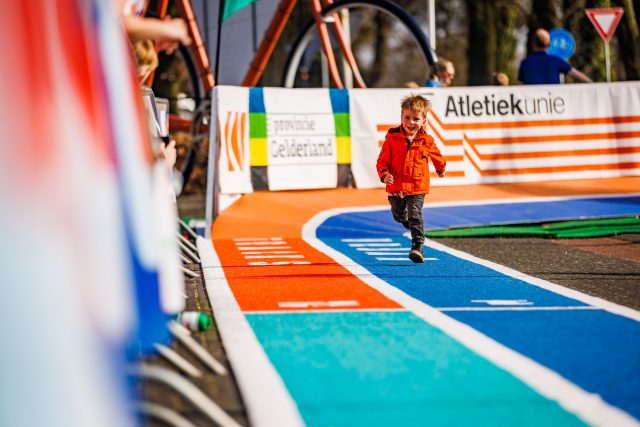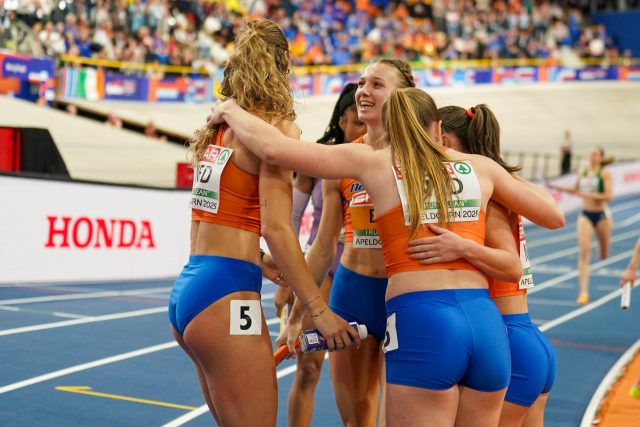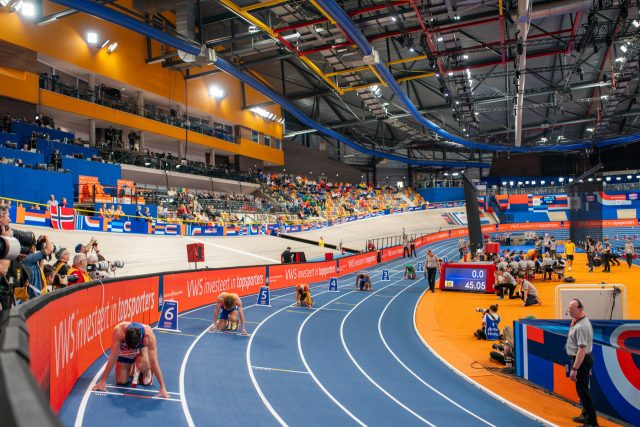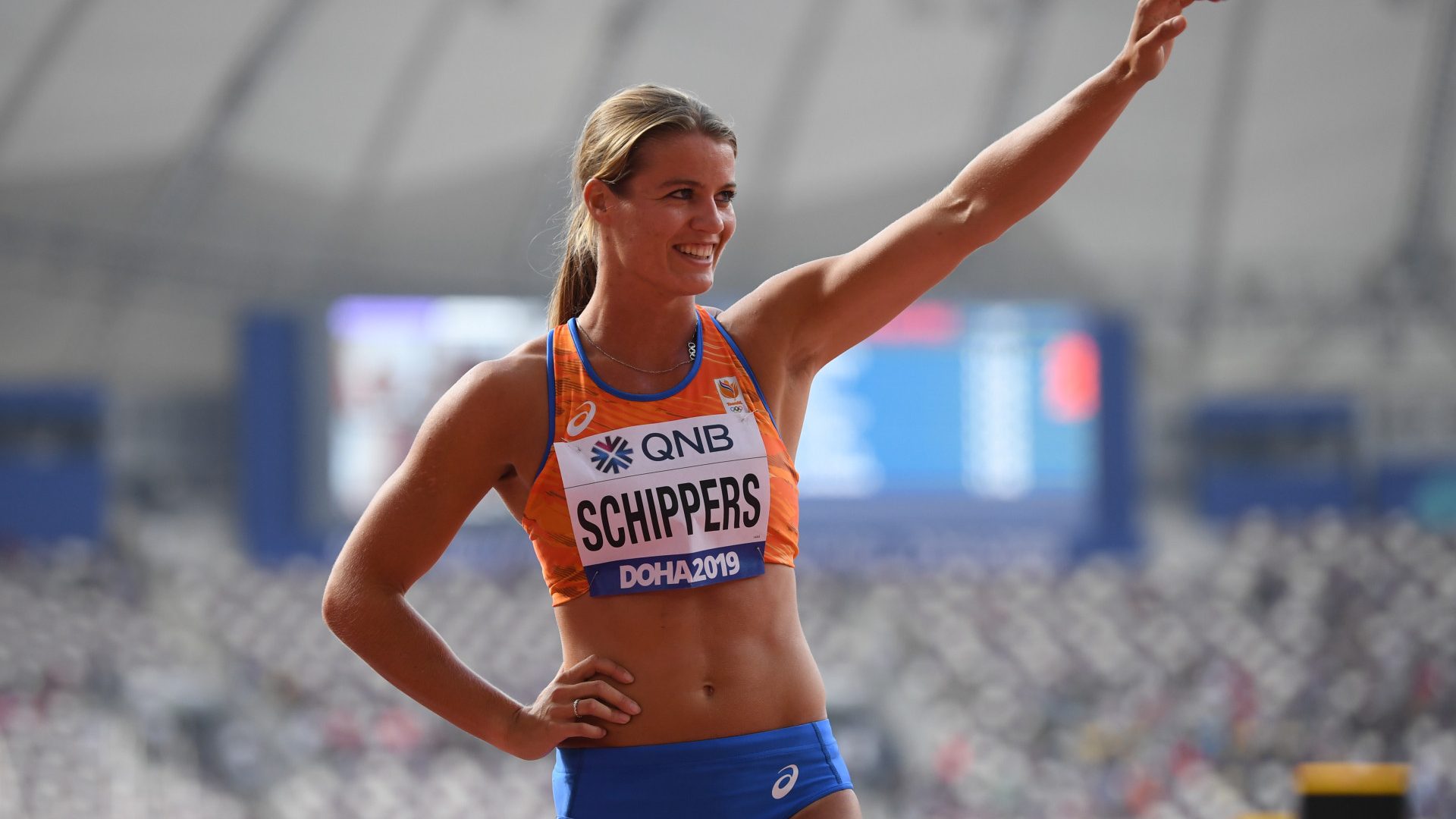
‘The easiest job ever’, says Dafne Schippers laughing about her job as tournament director of the 2025 European Athletics Indoor Championships in Apeldoorn. After all, on the day she announced the news as tournament director, almost all tickets had already been sold. But that comment isn’t really serious, she quickly makes clear. The event must offer quality, both for the athletes and the spectators. And Schippers is looking forward to contributing to that.
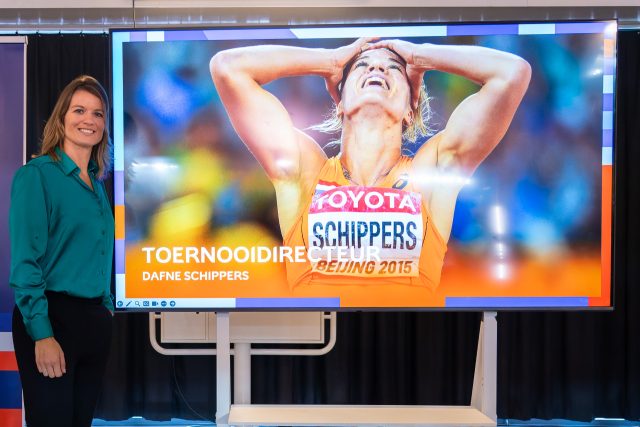
She has experienced a special summer. For the first time, she stood literally on the other side of the barriers at major athletics events. Not among the athletes talking to the press in the mixed zone, but with a microphone in her hand. At the World Indoor Championships in Glasgow and at the World Relay Championships at the Bahamas, she was a co-commentator for World Athletics Broadcasting. This footage is available for countries which don’t have a broadcaster onsite to cover athletics. In the Netherlands, she was mainly seen and heard during the Olympic Games in Pris, where she worked for the Dutch public broadcaster NOS.
‘I really needed time and space to discover this new world’
‘For the last fifteen years, my life was pretty much fixed with the same daily routines of training and competition. Every year, together with my coach, we set goals; these were the major events that you had in mind every day. Once you have to decide to stop performing at this top level, like I unfortunately had to do a year ago, you don’t immediately fill up those days with something new. And I didn’t want that either; I was looking for time and space to discover this new and different world’, says Schippers.
‘And this summer I was lucky to have had those opportunities. I was really thrown in at the deep end, both on radio and TV and also in different roles: commentator, interviewer and analyst. I sometimes thought: I can’t do this at all. But luckily I had experienced people next to me and your English doesn’t have to be perfect. It was really cool to get those opportunities.’
She got to know sports journalism from the other side: the side of the media. ‘I know that I could be quite grumpy myself sometimes when I had to speak to the press in the mixed zone after competition. But I also know that it is not always easy to have to answer questions ten minutes after finishing, while the adrenaline is still pumping out of your ears. Those are really difficult situations.’
‘This year I also said yes to being an ambassador for the sports supporter program Univé, a Dutch cooperative insurance company.. Which means that I become a “face” of Univé’s social initiatives around sports, exercise and health. And I regularly give clinics to young and old(er) people, which I really like’.
‘Now the work towards Apeldoorn 2025 really begins’
Now that the athletics summer is over, she is also taking up her role as tournament director again. ‘The work is really starting now,’ she says. She calls it an honourable task to promote the sport she loves and to discuss all aspects of the event together with Amy Kortbeek – who is involved in the organisation of the European Athletics Indoor Championships on behalf of the Dutch Federation.
After all, Schippers has gained the necessary experience as an athlete at the many major events she has participated in these last years. And among these were also many indoor Championships. As a 19-year-old, her first European Indoors were in 2011, when she reached the semi-finals of the 60 metres in Paris. Two years later, she ended fifth in Gothenburg and in 2015 she won the gold in Prague, in a sharp 7.05 sec. Her last European Indoor Championship was Glasgow 2019, where she got the silver medal. ‘But that is also where I suffered the back injury that eventually forced me to stop,’ she says.
How does she look back on her “own” European Indoor Championships? Remarkably enough, she doesn’t have very specific memories of them. ‘But that’s probably because I’ve done a lot of big events. For some athletes, participating in a European Indoor Championship is their highlight, for others it’s a great starting point for an international career. The latter doesn’t apply to all athletes of course.
Americans and Jamaicans sometimes skip the indoor season completely. Indoor is more popular in Europe. For me, indoors always were a nice break from the months of training between September and May. But the indoor season was always about preparing for the summer. When I was a heptathlete, for example, I didn’t compete in the pentathlon at major indoor events because it was just too much.’
She obviously hopes that many Dutch athletes will compete at indoor competitions and especially participate in the European Indoor Championships early March. But she will not be holding any recruitment campaigns at Papendal for this. ‘Everyone makes their own choices. I don’t think I have much influence on that. But a big event in your own country is of course a great opportunity to get attention for yourself as an athlete and it’s just very special to compete in your home country for your own audience. I experienced this in 2016 at the European Athletics Championships in Amsterdam (where Schippers won gold in the 100m and the 4×100 relay). When you literally have the entire stadium behind you, it is a very special feeling.
‘I really see Amsterdam 2016 as the turning point in the love and interest for athletics in the Netherlands. We have ended up in a luxurious position and that is very beneficial for the top athletes of today.’
‘The event must excel in quality’
Schippers wants to use her experience from major events to bring the organisation in Apeldoorn to a high level. What do the athletes need and what should the organisation avoid? ‘What I have always found very important is the peace and quiet in the call room, where the athletes have to wait until they go onto the track. Everything has to run smoothly there and it shouldn’t be too busy. That means that the volunteers need to be well instructed, but also that you shouldn’t be too strict with the rules.’
‘Especially at indoor competitions/events it is often quite confusing, because many athletes are doing their warm-up at the same time in a small space. The different routes at the venue(s) have to be very clear to everyone. We have to deal with/manage this in a good way in Apeldoorn too, to ensure that there is as little stress as possible for everyone. It is really nice that European Athletics has agreed to start on Thursday evening with the event, so that the program is a little less packed.’
She herself, even at a World Championship, has stayed in a hotel once where cockroaches were running through the room and where the food was so bad that athletes saw no other option rather than looking for alternative restaurants.
‘Some organisers/organisations do not understand how important good food is for athletes to perform. But if there is one thing I am not worried about at the European Championships in the Netherlands, it’s the quality of the hotels and the meals. If something does not go quite as planned, we will be able to make adjustments quite quickly. I am approachable, I am close to the athletes and if possible I will arrange it, because we want to offer quality. The lines of communication are short.’
Cors van den Brink


